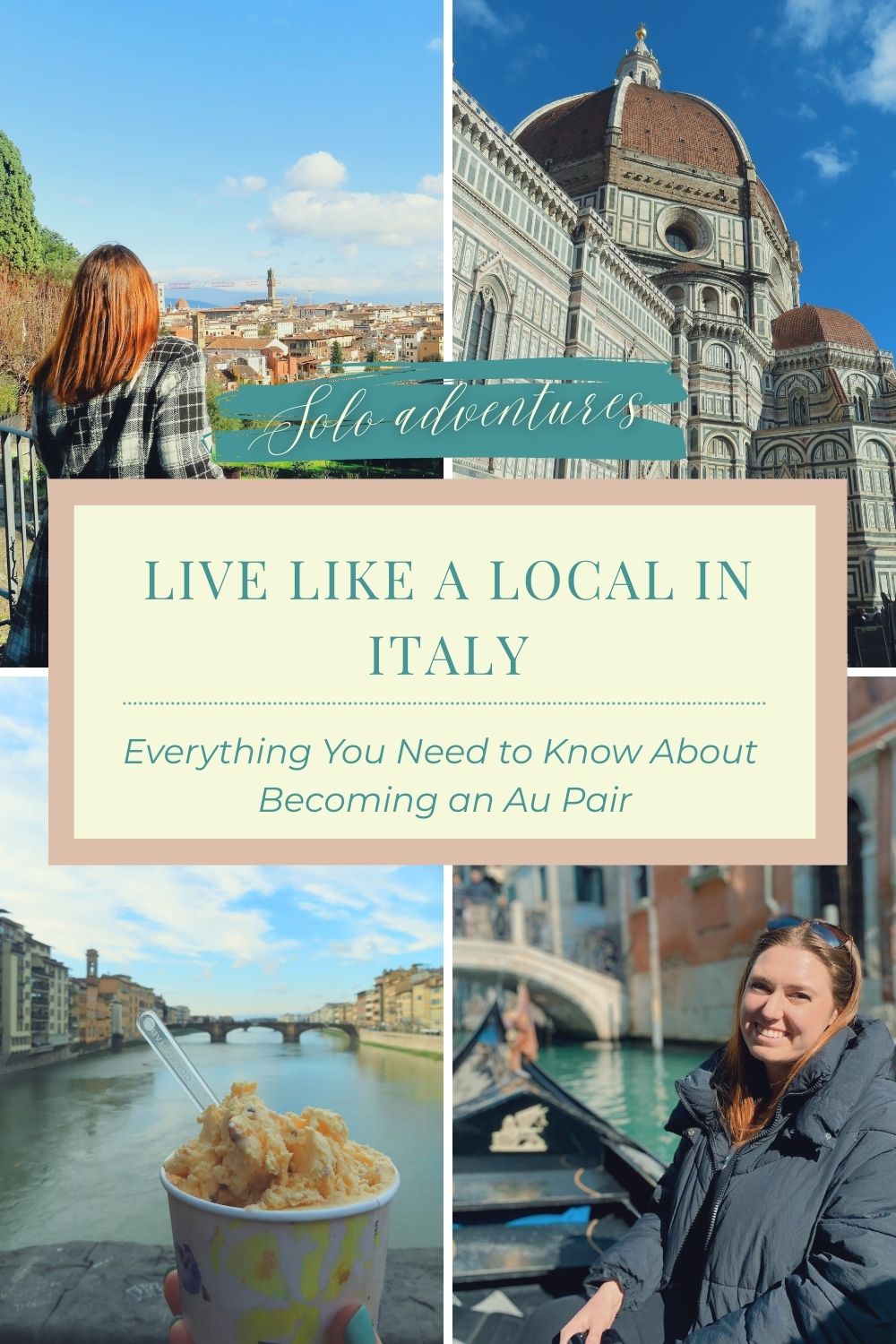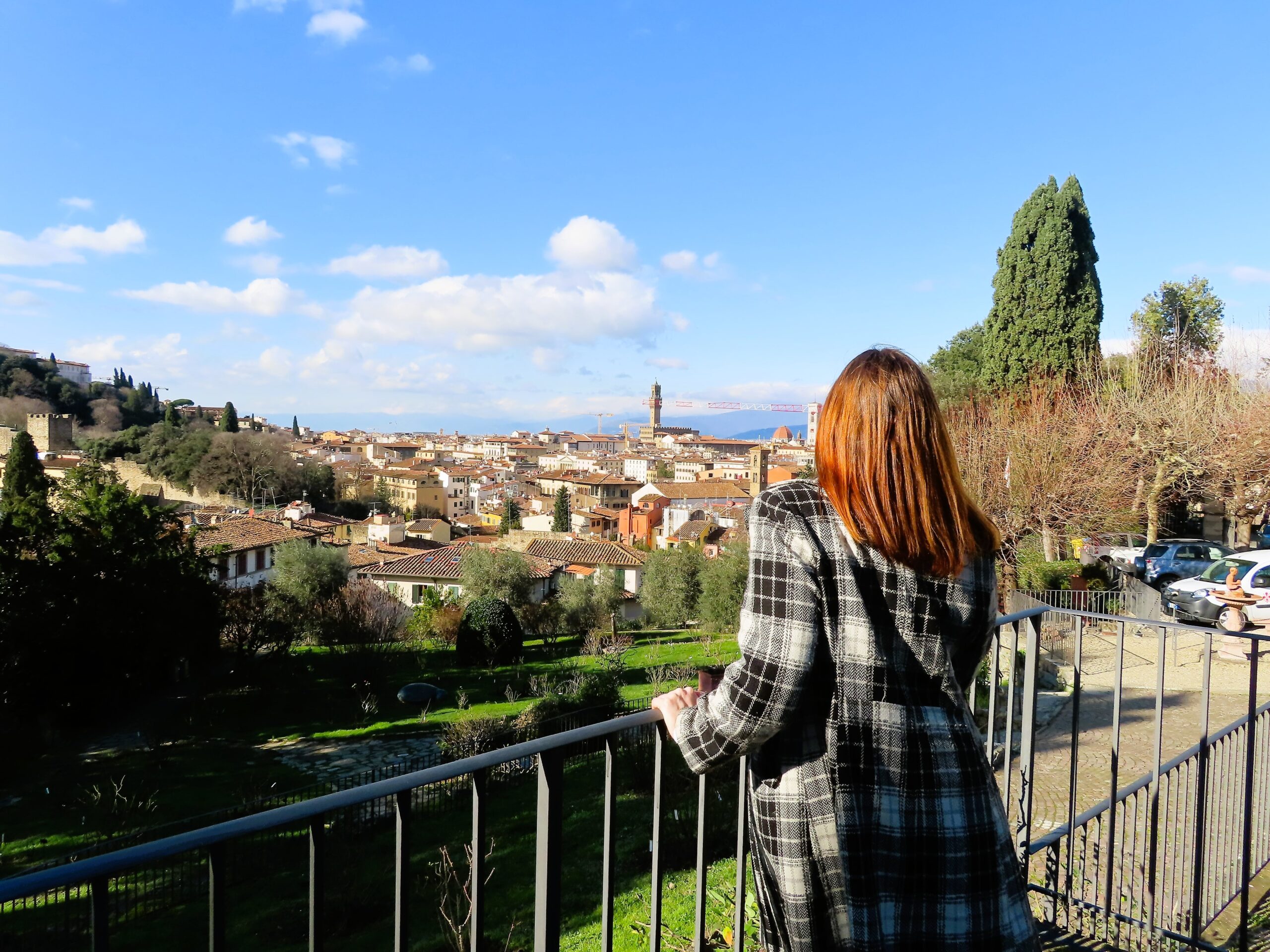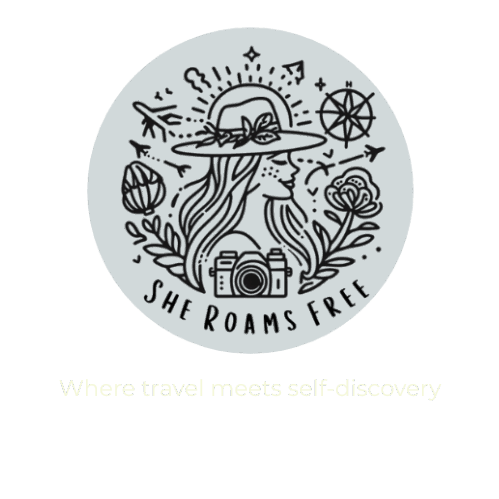How to Become an Au Pair: My Italian Adventure & Guide

Have you ever dreamed of immersing yourself in the rich culture of Italy, living with a local family, and exploring the breathtaking landscapes of this iconic country? Becoming an au pair offers you just that—an opportunity to live and work in Italy while experiencing the everyday life of an Italian family. In this guide, I’ll share my personal journey of becoming an au pair in Italy and provide a step-by-step guide for those aspiring to follow a similar path.
If you’re thinking about traveling solo for the first time, becoming an au pair is such a great way to ease into it while still having a support system — and I’ve written a whole post on solo travel you can check out here.
Why Choose Au Pairing in Italy?
When I found myself craving a change of pace (and scenery), Italy just made sense. I was tired of the cold English greyness and still reeling from my original travel plans falling apart — but the idea of spending a few months immersed in pasta, language, and culture sounded like exactly what my soul needed. I knew I couldn’t work as a speechie in Italy, but au pairing offered the perfect loophole: a way to live like a local, stay rent-free, and explore a new country on a budget.
And Italy? She delivered. Between the food, the warmth of the people, and the chance to learn and grow in a whole new way, au pairing there was the ultimate “I have no idea what I’m doing, but let’s try it anyway” decision that paid off. Au pairing in Italy not only allows you to explore this beautiful country but also provides a chance to:
- Immerse in Italian culture: Live like a local and experience authentic Italian traditions, festivals, and daily life.
- Learn the language: Enhance your Italian language skills through daily interactions with your host family.
- Personal growth: Gain independence, confidence, and a deeper understanding of yourself through new challenges and experiences.
Understanding the Role of an Au Pair
An au pair is essentially a cultural exchange participant who lives with a host family and helps with childcare and light housework in exchange for accommodation, meals, and a stipend. The role also involves:
- Cultural exchange: Sharing your culture and language with the host family while learning about theirs.
- Building relationships: Forming strong bonds with the children and host family members.
- Enjoying perks: Free accommodation, meals, a weekly stipend, and ample time to explore the country.
My Personal Journey to Becoming an Au Pair in Italy
I didn’t set out to become an au pair in Italy — it was a last-minute pivot. I’d moved to the UK to work as a speech pathologist and technically had a job, but delays with my registration meant I had to take a lower-paying hospital role just to get by. I wasn’t earning what I’d planned, and after months of NHS bureaucracy and surviving the eternal greyness of an English winter, I felt completely stuck and disconnected from the adventurous life I’d been chasing.
I knew I had a big year ahead — a summer back at camp and a two-month Europe trip already booked — but I didn’t want to spend the in-between time waiting. I wanted to be somewhere that felt alive.
Italy had always pulled at my heartstrings. Maybe it was the pasta addiction. Maybe the Lizzie McGuire movie. Maybe the fact that my name is literally Italian. But it felt like the perfect place to reset. The only catch? I didn’t speak the language, and I knew I couldn’t work as a speechie there without the right visa or certification.
Cue: the very spontaneous idea to become an au pair.
Thanks to the Schengen Agreement (yes, I had to Google how to spell it too), I knew I could stay in Italy for 90 days without a visa. I had experience with kids, and I needed something now. So, I did what any determined girl with Wi-Fi would do — I Googled “how to become an au pair in Italy” and landed on AuPairWorld.com.

Within days, I’d made a profile and started chatting with families. Some calls felt off, but then I met them — a warm, kind family in Bologna. Not a city that was ever on my bucket list, but they felt right. We FaceTimed, we laughed, and I could picture myself there.
They had three daughters: 11, 16, and 20 — so I felt more like a big sister than a nanny. I looked after Miss 11 (school runs, lunch, a bit of afternoon supervision), cooked dinner most nights, picked up the middle daughter from volleyball, read essays for the eldest, and had deep convos about life, friendships, and Australia. I basically became their honorary fourth daughter.
What I wasn’t expecting? How close I’d become with the mum. She worked for an international company and struggled with the English-speaking side of things, so we started doing nightly “lessons” after dinner — post-it notes on the walls, fake practice meetings, and lots of laughter. It’s still one of my favourite memories.
And the free time?! I had full Wednesdays and most weekends off. I took solo trips to Rome, Florence, Milan, Venice — and even got ski lessons during a weekend at their mountain apartment (iconic behaviour). I mastered Italy’s public transport (Flixbus was my bestie) and became a semi-professional Italian driver — which I do not recommend unless you’re spiritually prepared.
I even spent my 26th birthday with them — cake, an Italian “Happy Birthday,” and enough pasta to feed a small village. They welcomed me into their world, teased me about my Aussie breakfasts (apparently butter and eggs on toast is weird), and made me feel like one of their own.
It wasn’t perfect. But it was exactly what I needed — freedom, family, growth, and a whole lot of pasta.
Step-by-Step Guide on How to Become an Au Pair in Italy
Ready to turn your daydreams of Italian life into reality? Here’s exactly how to make it happen – from finding the right host family to packing your suitcase (and avoiding any cultural faux pas like putting sauce on your tortellini… trust me).
1. Check If You’re Eligible
To become an au pair in Italy, you’ll usually need to:
- Be aged 18–30
- Be in good health with no criminal record
- Have some childcare experience (formal or informal)
- Speak basic English (Italian is helpful but not required)
2. Find a Host Family (and Trust Your Gut)
Finding the right host family is everything. You’re not just choosing a job — you’re choosing who you’ll live with, laugh with, and share your spaghetti with. I used AuPairWorld and highly recommend it.
Helpful Questions to Ask Prospective Families:
- What does a typical weekday look like for your family?
- How independent are the children, and what support do they need?
- Will I have my own space and access to Wi-Fi?
- What are your rules about curfews, visitors, and free time?
- What are your expectations around chores, cooking, and childcare?
Pro tip: If the vibe feels off on a video call, that’s a sign. I had one family who seemed great on paper, but I just didn’t feel relaxed around them. I’m so glad I kept looking.
3. Craft Your Profile + Application
Once you find a platform, you’ll need to:
- Create a profile that showcases your personality and experience with kids
- Write a friendly, honest intro letter
- Be proactive — message families you’re interested in!
4. Handle the Paperwork (It’s Not as Scary as It Sounds)
Depending on your citizenship, you may not need a visa for stays under 90 days (thanks, Schengen Zone!). But always double-check the rules for your country.
You may need:
- A formal au pair agreement (most websites provide a template)
- Proof of health insurance
- A signed invitation letter from the host family
5. Prep Like a Pro
Here’s how to make your transition smoother:
- Pack light but smart: Layers, comfy shoes, one “nice” outfit, and snacks from home
- Bring small gifts: I brought Aussie chocolates and magnets – big hit!
- Get the logistics sorted: Travel insurance, airport pickup plan, and emergency contacts
Then? Book that flight. Italy’s waiting!

Day-to-Day Life as an Au Pair in Italy
No two days looked exactly the same – and honestly, that was part of the fun. A typical weekday started with a school run (often involving some very animated car karaoke), followed by a quiet mid-morning espresso, then a few hours of downtime or exploring Bologna’s old streets before heading back to school pick-up. In the afternoons, I’d help Miss 11 with her lunch and occasionally homework — though she was so studious, I mostly just existed as a snack facilitator and life coach. Evenings were my favourite: cooking dinner for the family, chatting about our days, and then doing English lessons with the mum using post-it notes on the dining room walls like we were plotting world domination.
Some of my favourite memories were made in the kitchen. One night, the dad taught me how to make a proper carbonara (hint: cream is NOT invited). And then there was the time I proudly served up tortellini with red pasta sauce – only to be met with looks of horror from the girls, like I’d just dumped cement into their bowls. I quickly learned that tortellini is meant to be served in broth, with a sprinkle of parmesan – and I never made that mistake again.
The house was full of laughter, especially when the girls tried to perfect their Aussie accents. I’d be in stitches hearing them howl with exaggerated flair: “Cleooour naaauuur!” And on slower afternoons, Miss 11 and I would make up full-on dance routines and perform them like we were auditioning for an Italian edition of Dance Moms.
- Typical Schedule: School drop-offs and pick-ups, meal prep, light household tasks, and free afternoons to explore or recharge.
- Cultural Experiences: Sharing meals with the family, celebrating birthdays and traditions, and learning that yes, pasta can be a first course every single day.
- Socialising: I recommend using Facebook groups or Bumble BFF to meet other au pairs or locals and saying yes to social events with your host family.
Challenges and How to Overcome Them
- Stay connected to home and build comforting routines. Schedule weekly FaceTime catch-ups with your bestie, find your rhythm with an au pair-friendly exercise routine, and carve out time for self-care, like reading, journaling, or whatever fills your cup.
- Cultural differences: Be patient, ask questions, and embrace differences.
- Managing expectations: Clarify duties and be honest about your needs — and above all else, trust your gut. If something feels off in your conversations with a prospective family, it probably is. You’re not being dramatic or picky — you’re being safe and intentional about who you’re going to live with in a foreign country.
When I told my mum I was moving to Italy the following week to live with a family I’d never met, her immediate response was, “Isn’t it kinda crazy to go live with strangers across the world? What if they’re murderers?” (Thanks, Mum.) While she was being slightly dramatic, she wasn’t entirely wrong. You’re putting a lot of trust in a family, and that’s why it’s so important to go with your gut feeling. I had a few calls with families that just didn’t click, and I’m so glad I waited for the right one. Your safety and comfort matter — don’t settle just to get going quickly.
Exploring Italy During Your Stay
- Travel destinations: Explore cities like Rome, Florence, Venice, and smaller towns.
- Budget tips: Use Flixbus, regional trains, and free local attractions.
- Balancing work and travel: Make the most of your days off to roam.
- Socialising: If you’ve made a few connections – don’t let them fizzle! Plan a day trip together or meet up to explore a new spot. Chances are, they’ll know places you haven’t even heard of yet.
Financial Insights
- Understanding your payment: Know what’s included and how far it’ll stretch. As you typically get free accommodation and meals, the actual payment isn’t much, so if you’re planning lavish weekend trips or preloading a Euro summer, it helps to have some decent savings on standby. That said, I did not have heaps (I was saving for a two-month Europe trip at the same time), and I still made it work just fine.
- Budgeting Tips: Shop locally, cook meals, and enjoy simple pleasures.
- Supplemental Income: Tutoring in English might be an option, but check with your host family first.
Tips for Prospective Au Pairs
- Do: Ask lots of questions, trust your gut, and set clear boundaries. Create a list of dealbreakers and non-negotiables before you even start searching.
- Do: Pack a little comfort from home (yes, even if it’s Vegemite or your childhood teddy — no judgement).
- Do: Keep a journal of your time there — even if just to laugh at your early culture shock later on.
- Don’t: Settle for a family that doesn’t feel right, even if the location is dreamy.
- Don’t: Assume you have to say yes to everything just to keep the peace — you’re allowed to have needs and preferences.
Resources: Use AuPairWorld, Duolingo, and Facebook groups for au pairs in Italy — they’re gold for advice and making new friends.
Final thoughts…
Becoming an au pair in Italy was a life-changing adventure filled with unforgettable memories, new connections, and personal growth. If you’re wondering how to become an au pair in Italy or whether it’s the right path for you, I hope this guide has given you both practical steps and real insight. From navigating host family interviews to cooking pasta the right way (eventually), au pairing gave me so much more than just a place to stay — it gave me a deeper understanding of myself and the world around me.
If you’re searching for travel opportunities for young women or looking for cultural exchange jobs that don’t require a degree, becoming an au pair might be your perfect match. If you have any questions about how to become an au pair in Italy, feel free to reach out — I’m always happy to help you roam free.
Buona fortuna!
💌 Let’s Keep Roaming Together
• ✨ Subscribe for soulful travel stories + practical tips
• 📍 Follow on Instagram for real-time adventures
• 🧭 Download your Free Solo Travel Journal Prompts to reconnect before your next trip
Until next time — keep roaming free 🤍
Francesca x


